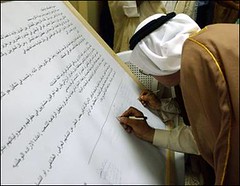By Cpl. Michael Molinaro
2nd BCT PAO, 4th Inf. Div.
FOB KALSU, Iraq – “He who kills a person without reason is like he who kills all humanity.” – from the Holy Koran.
Seeking a unified province free from terrorism and factional violence, leaders of Iraqi groups in Babil came together Aug. 20 in al-Hillah to reconcile and denounce the attacks that have plagued the country.
Iraqi security forces leadership, representatives of the Iraqi national government, local government officials, civic leaders, tribal sheiks and religious leaders joined together at the Iraqi Police academy convention hall to map out a strategic plan to shape a peaceful future for Babil.
“This was Iraqi generated, Iraqi led,” said Col. John Tully, commander, 2nd Brigade Combat Team, 4th Infantry Division, an invited guest of the ISF leadership. “They are clearly trying to come to grips with the issues their society is facing.”
The meeting was orchestrated by Maj. Gen. Qais Hamza, Babil provincial police chief, to bring representatives of every facet of Babil culture to the conference and provide them a forum to speak. It was hoped the meeting would signify the commencement of a new era in the region and the beginning of the end of terrorism in southern Iraq, said a sheik in attendance {Click on image for photo details}

1 comment:
“We have Sunnis, Shia, women, children – that is a miracle in this day and age,” he said. “Everybody knows what needs to be done, but General Qais is the person who decided that it was time to quit talking and start acting.”
The idea sprung from Iraqi Prime Minister Nouri al-Maliki’s 24-point national reconciliation initiative outlined to the Iraqi National Council of Representatives in June. Sectarian violence has plagued Iraq for much of the year, and leaders of Babil said they wanted to lead the rest of the nation in heeding Maliki’s words.
The meeting kicked off with children from the area singing the Iraqi national anthem and reading from the Holy Koran. Those in attendance took turns speaking on the situation in Iraq and Babil and offered suggestions on how to unify the region.
“There is no winner in war,” said Aeman Alkhafaji. “Everybody is a loser.”
Speaking on behalf of a women’s rights group, Alkhafaji said sectarian violence is destroying the greatest part of Iraqi culture – the family.
When the man of the house dies, there is no one to provide for the family, no backbone present to steer the children to their future, said Alkhafaji. When a woman is killed, it crushes the family dynamic and children lose the comforting, tender side of the family.
“A woman without her man is like land without water,” she said. “And a man without his woman is like a ship without sail.”
Numerous Sunni and Shia tribal leaders spoke to the congregation and offered their hand to one another, promising to not let the trouble witnessed in Baghdad infiltrate their region.
“We are not Sunni or Shiite, Kurdish or Christians,” one sheik said. “We are Iraqis, and we intend to secure Iraq. The people who are fighting the old regime and each other are the same people that have lived together for over a thousand years and have drank from these two rivers.”
As the day wore on, Qais presented a draft reconciliation agreement for consideration.
The last paragraph read: “We have sworn this oath; we accept the promise of the Provincial Government to provide security for all citizens without regard to their sect, ethnicity or political party affiliation and to work toward inclusive, representative government unencumbered by bias and disenfranchisement.”
Qais then challenged the more than 500 in attendance to sign the oath, pledging to exert every effort to make Babil the place all of Iraq strives to be. A large reproduction of the document was placed by the door as the crowd exited.
Everyone signed it.
“Let Babil be the example for the freedom and the mixture that we have in Iraq,” said Col. Abbas, al-Hillah police chief.
Smiles and kind words were abundant as the participants headed home. More work is left to be done, but the initiative Qais introduced seemed to have struck a chord with a people fed up with violence and instability.
“It was very uplifting,” said Tully. “In this society, when you get that many Sunni and Shia sheiks to support a plan, there is a chance for success.
“If Babil can keep people like Gen. Qais in leadership positions, it will be the most progressive and truly democratic province of the southern provinces in Iraq .”
Post a Comment